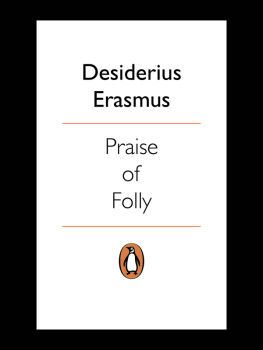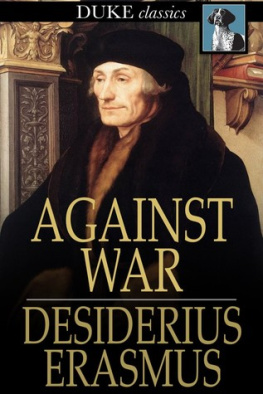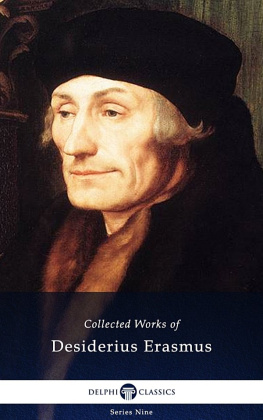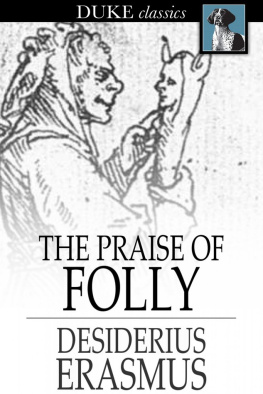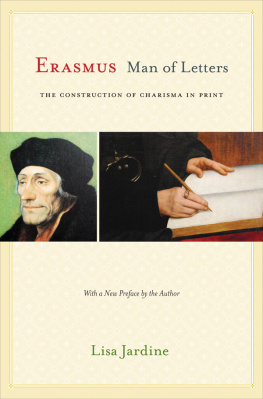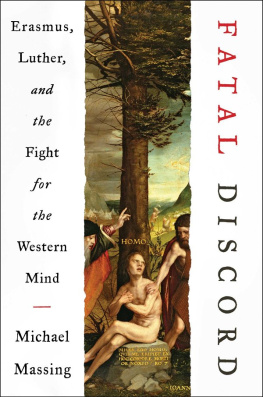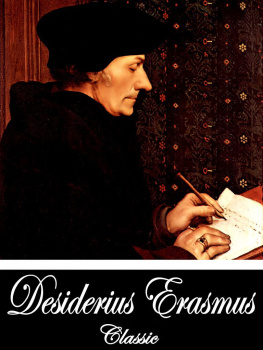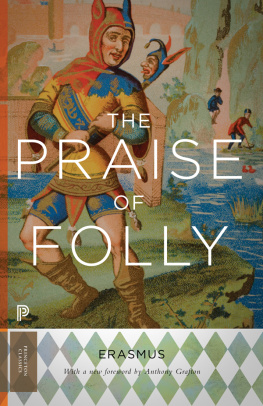Between Utopia
and Dystopia
Between Utopia
and Dystopia
Erasmus, Thomas More, and the Humanist Republic of Letters
Hanan Yoran
Lexington Books
a division of
rowman & littlefield publishers, inc.
Lanham Boulder New York Toronto Plymouth, UK
Published by Lexington Books
A division of Rowman & Littlefield Publishers, Inc.
A wholly owned subsidiary of The Rowman & Littlefield Publishing Group, Inc.
4501 Forbes Boulevard, Suite 200, Lanham, Maryland 20706
http://www.lexingtonbooks.com
Estover Road, Plymouth PL6 7PY, United Kingdom
Copyright 2010 by Lexington Books
This book was published with the support of the Israel Science Foundation.
All rights reserved . No part of this book may be reproduced in any form or by any electronic or mechanical means, including information storage and retrieval systems, without written permission from the publisher, except by a reviewer who may quote passages in a review.
British Library Cataloguing in Publication Information Available
Library of Congress Cataloging-in-Publication Data
Yoran, Hanan, 1963
Between utopia and dystopia : Erasmus, Thomas More, and the humanist Republic of Letters / Hanan Yoran.
p. cm.
Includes bibliographical references and index.
ISBN 978-0-7391-3647-8 (cloth : alk. paper) ISBN 978-0-7391-3649-2 (electronic)
1. Erasmus, Desiderius, d. 1536. 2. More, Thomas, Sir, Saint, 14781535. 3. HumanismHistory. 4. Autonomy (Philosophy)EuropeHistory16th century. I. Title. II. Title: Erasmus, Thomas More, and the humanist Republic of Letters.
B785.E64Y67 2010
199'.492dc22
2009048742
` The paper used in this publication meets the minimum requirements of American National Standard for Information SciencesPermanence of Paper for Printed Library Materials, ANSI/NISO Z39.48-1992.
Printed in the United States of America
To my parents
Acknowledgments
Studying the Renaissance genealogy of the modern intellectual during the early years of the twenty-first century has been a riveting, ambivalent and enlightening endeavor. This book was written during a period dominated by the eroding position of the humanities and by an often blatant anti-intellectualism aggressively promoted by an ever-more intellectually impoverished neoliberal ideology. Such times call for a determined response. At first glance, this book does not provide such a response. Indeed, it reveals the problems inherent in any attempt to employ humanist knowledge and skills on behalf of a vision of a better society. It examines the internal strains and paradoxes that are no less characteristic of the identity of the intellectual than are his or her achievements. These troubles cannot be evaded. They must be contemplated and confronted. The experience of the past several centuries surely confirms this insight. Recognition of the inherent strains in the intellectuals identity is, in fact, the only viable path available today. For only by turning the self-examination of the contradictions of their own position into an essential part of their intellectual activity can modern intellectuals hope to make a difference.
The invaluable aid Ive received from others during the course of writing this work has also proved to be related to my subject. My teachers, colleagues and friends have proved to be true intellectuals. Their scholarly activity is both self-reflective and informed by wider social and political concerns. My greatest debt is to Rivka Feldhay, who introduced me to the human sciences and the wonders of the Renaissance. She then followed every step of my research. Long discussions with Igal Halfin, true friend and true scholar, always provided new insights. Miri Eliav-Feldon, Joseph Mali, Yahuda Elkana, my brother Noam, Michela Turno, Ofer Gal, Raz Chen-Morris, Michael Zakim and Gur Zak read parts of the study (and listened to my protracted monologues about other parts) and their critical responses greatly improved my arguments and sharpened my thinking. A Yad Hanadiv fellowship enabled me to quietly pursue my research for two years. The beautiful Villa I Tatti, the Harvard University Center of Italian Renaissance Studies, where I spent a year as a visiting scholar, was an ideal place to conduct that research. There, in Fiesole, the late Salvatore Camporeale and John Najemy showed me how much I still needed to learn about the Renaissance. This book was published with the support of the Israel Science Foundation.
Earlier and abridged versions of chapters 5 and 6 were published as Thomas Mores Richard III : Probing the Limits of Humanism in Renaissance Studies 15 (2001) and Mores Utopia and Erasmuss No Place in English Literary Renaissance 35 (2005), respectively.
My warmest gratitude goes to my wife, Limor, who patiently endured all the moods invariably involved in writing (not to mention other aspects of academic life), and to my daughter, Anat, who at the age of three already knows that daddy works in books.
Abbreviations
Works of Erasmus
AB The Antibarbarians . Translated by Margaret Mann Phillips. In CWE 23, 16122.
Civ On Good Manners for Boys . Translated by Brian McGregor. In CWE 25, 27389.
Co Copia: Foundation of the Abundant Style . Translated by B. Knott. In CWE 24, 296659.
CR The Godly Feast . Translated by Craig R. Thompson. In CWE 39, 171243.
CWE Collected Works of Erasmus . Various editors. Toronto: University of Toronto Press, 1974.
DB War Is a Treat for Those Who Have Not Tried It . Translated by Denis L. Drysdall. In CWE 35, 399440.
E The Handbook of the Christian Soldier . Translated by Charles Fantazzi. In CWE 66, 8127.
EtV Letter to Paul Volz. Translated by Charles Fantazzi. In CWE 66, 823.
FD A Fish Diet . Translated by Craig R. Thompson. In CWE 40, 675762.
FW A Discussion of Free Will . Translated by Peter Macardle. In CWE 76, 589.
IP The Education of a Christian Prince . Translated by Neil M. Cheshire and Michael J. Heath. In CWE 27, 20388.
LB Desiderii Erasmi Roterodami opera omnia , 10 vols. Edited by Jean Leclerc. Leiden, 17036.
P The Paraclesis . Edited by J. C. Olin. In Christian Humanism and the Reformation: Selected Writings of Erasmus , 93106. New York, 1965.
Puer A Declamation on the Subject of Early Liberal Education for Children . Translated by Beert C. Verstraete. In CWE 26, 295346.
Pan Panegyric for Archduke Philip of Austria . Translated by Betty Radice. In CWE 27, 675.
QP A Complaint of Peace . Translated by Betty Radice. In CWE 27, 289322.
RS On the Method of Study . Translated by B. McGregor. In CWE 24, 66591.
SA The Sileni of Alcibiades . Translated by R. A. B. Mynors. In CWE 34, 26282.
Scar A Dung-Beetle Hunting an Eagle . Translated by Denis L. Drysdall. In CWE 35, 178214.
Works of Thomas More
CWM The Complete Works of St. Thomas More . Various editors. 15 vols. New Haven, Conn.: Yale University Press, 19631986.
MtD Letter to Martin Dorp. Edited by Daniel Kinney. In CWM 15, 1127.
MtL Letter to Edward Lee. Edited by Daniel Kinney. In CWM 15, 15195.
MtM Letter to a Monk. Edited by Daniel Kinney. In CWM 15, 197311.
LtO Letter to the University of Oxford. Edited by Daniel Kinney. In CWM 15, 12949.
R The History of King Richard the Third . Edited by Richard S. Sylvester. In CWM 2, 193.
RL Historia Richardi Tertii . Edited by Daniel Kinney. In CWM 15, 313485.
U Utopia . Edited by George M. Logan, Robert M. Adams and Clarence H. Miller. Cambridge, 1995.


